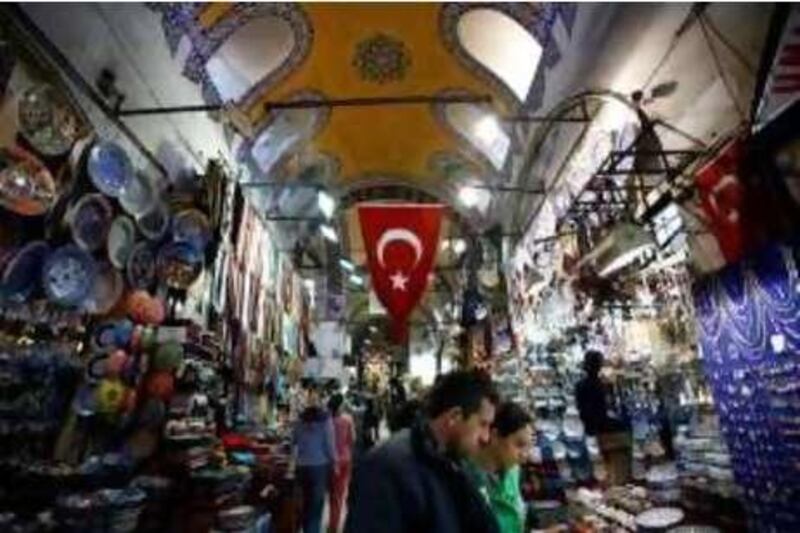ISTANBUL // The main reason why millions of holidaymakers from all over Europe flock to Turkey's beaches every summer is that the weather is much sunnier and hotter here than back home. For Ali al Daraj and his family, it is exactly the other way round.
"We love the weather," the 15-year-old boy from Baghdad said recently, as he was strolling down a street towards Taksim Square in the centre of Turkey's metropolis, Istanbul, together with his father, his uncle and other relatives. "It is so hot in Iraq now." Eleven members of the al Daraj family from Iraq and Jordan chose Turkey for a one-month holiday that will include a visit to Ankara, the capital, as well as a prolonged stay in Istanbul. "It is so beautiful here; there are so many different things to see and do," Ali said.
The al Darajs are not alone. Although still small compared with the mass of European tourists, the number of Arab holiday makers in Turkey has been rising steeply. Many shops, travel agencies and restaurants in the Talimhane neighbourhood close to Taksim Square, where Ali and his family started their walkabout, have Arab-language signs. According to figures provided by the tourism ministry in Ankara, about 105,000 visitors from a group of Arab countries comprising the UAE, Saudi Arabia, Syria and others came to Turkey in May this year, an increase of about 33 per cent over May 2009. Overall, there were 3.15 million foreign visitors in Turkey in May, up 15 per cent from the corresponding month last year. In total, Turkey welcomed 27 million visitors in 2009.
But numbers alone do not tell the whole story. Travel industry sources say the average Arab tourist spends much more money and stays much longer than European holiday makers, most of whom come to Turkey with cheap package tours. "An Arab will spend in a day what a European package tourist will spend on his whole holiday," said Aydin Ulcay of the Alharran travel agency. Some Arab families will spend US$5 million (Dh18.3 million) on a lavish wedding at one of the posh hotels on the Bosphorus, Turkish newspapers have reported. Others will rent a villa for their holiday. While Europeans tend to come in pairs or small groups, Arabs like the al Darajs bring their extended families.
Several travel entrepreneurs said in interviews that the rise in the numbers of Arab tourists in Turkey began shortly after the religiously conservative Justice and Development Party, or AKP, of Recep Tayyip Erdogan, the prime minister, came to power at the end of 2002. "Erdogan has a Muslim identity," said Abdulkadir Duger, the general manager of Alharran. Under Mr Erdogan, Turkey has markedly improved its ties with the Arab world, scrapped visa requirements with such countries as Syria and increased trade with Arab states. Travel entrepreneurs said the rise in Arab tourism was a long-term trend resting on several factors and not triggered by recent crises like the Turkish-Israeli confrontation over the Israeli attack on Turkish ships carrying aid for the Gaza Strip in May 31.
"They come because of the [cooler] weather, because there is halal food here, because Turkey is cheaper than Europe and because they love Erdogan," said Bedir Samur, sales manager for the Mostar rent-a-car service in Talimhane. If the reasons why Arab tourists choose Turkey are different from the motives of European visitors, so are the preferred travel destinations inside Turkey. Most Europeans fly to resort towns like Antalya or Bodrum along the southern and western coasts of Turkey. In contrast, many Arabs want to go to places like Bursa, a former Ottoman capital south of Istanbul, and to the Black Sea region, which is known for its forests and cool temperatures. A wall in Mr Duger's office at the Alharran travel agency is covered by a giant poster of Uzungol, a picturesque lake surrounded by lush green forests and mountains south of Trabzon on the Black Sea. Uzungol is a popular destination for Arab tourists, but almost completely ignored by western visitors.
Regions along Turkey's border with Syria in the south of the country have also reported a wave of visitors, mostly citizens from the southern neighbour benefitting from the lifting of visa requirements. The province of Hatay, for example, expects to see about 1.5 million visitors, mostly from Syria, this year, double the number registered last year, according to news reports. In the south, it is not the climate that attracts visitors, but shopping opportunities. Malls in Gaziantep, a major city close to Turkey's border with Syria, have introduced announcements in Arab for the benefit of Syrian customers who come to buy clothes, jewellery and other goods. "Businessmen in the city are extremely happy," CNN reported.
Turkish entrepreneurs do not expect an end to the trend any time soon. Turgut Gur, the chairman of the Turkish Tourism Investors Association, a business organisation, told Turkish media that although the number of tourists from Israel had fallen sharply since the recent tensions, the increase in the number of tourists from Arab countries had made up for it. "It will continue to increase," Mr Ulcay of the Alharran travel agency said about the wave of Arab tourists. "Things will keep going upwards as long as the Middle East does not run out of money."
@Email:tseibert@thenational.ae






